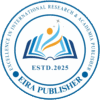Publication Ethics – EIRA Publisher
Ethical Standards, Integrity & Transparency
Introduction
At EIRA Publisher, we uphold the highest standards of integrity and follow COPE recommendations to ensure ethical, credible, and transparent scholarly publishing.
1. Author Responsibilities
- Originality & Plagiarism: Work must be original with proper citations. No self-plagiarism or duplicate submissions.
- Authorship & Contributions: Only those with significant involvement should be listed. Authorship changes require full co-author agreement.
- Data Accuracy: Data must be precise. Fabrication, falsification, manipulation, or selective reporting is prohibited.
- Multiple Submissions: Manuscripts cannot be under review elsewhere simultaneously.
- Conflicts of Interest: All financial, institutional, or personal conflicts must be disclosed.
2. Reviewer Responsibilities
- Confidentiality: Manuscripts must be kept confidential.
- Objectivity: Reviews should be fair, unbiased, and constructive.
- Ethical Oversight: Report suspected plagiarism or data fabrication.
- Timeliness: Reviews must be completed within the agreed timeframe.
3. Editor Responsibilities
- Fair Decisions: Editorial decisions must be unbiased and based on scholarly merit.
- Confidentiality: Manuscript content cannot be used personally.
- Handling Misconduct: Editors investigate ethical concerns thoroughly.
- Conflicts of Interest: Manuscripts with conflicts are reassigned.
4. Ethical Violations & Corrections
- Corrections & Retractions: Post-publication issues will be corrected or retracted.
- Author Accountability: Authors are fully responsible for the integrity of their work.
- Publisher Responsibility: Ethical concerns are handled fairly using COPE guidelines.
By submitting a manuscript, authors agree to all ethical requirements outlined above.
Additional Resources
• EIRA Publication Ethics Policy: View Ethics Policy
• COPE Guidelines: Committee on Publication Ethics
